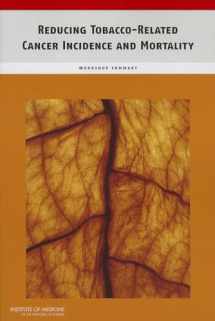
Reducing Tobacco-Related Cancer Incidence and Mortality: Workshop Summary
Book details
Summary
Description
Tobacco use is the leading cause of preventable death in United States, causing more than 440,000 deaths annually and resulting in $193 billion in health-related economic losses each year--$96 billion in direct medical costs and $97 billion in lost productivity. Since the first U.S. Surgeon General's report on smoking in 1964, more than 29 Surgeon General's reports, drawing on data from thousands of studies, have documented the overwhelming and conclusive biologic, epidemiologic, behavioral, and pharmacologic evidence that tobacco use is deadly. This evidence base links tobacco use to the development of multiple types of cancer and other life-threatening conditions, including cardiovascular and respiratory diseases. Smoking accounts for at least 30 percent of all cancer deaths, and 80 percent of lung cancer deaths. Despite the widespread agreement on the dangers of tobacco use and considerable success in reducing tobacco use prevalence from over 40 percent at the time of the 1964 Surgeon General's report to less than 20 percent today, recent progress in reducing tobacco use has slowed. An estimated 18.9 percent of U.S. adults smoke cigarettes, nearly one in four high school seniors smoke, and 13 percent of high school males use smokeless tobacco products.
In recognition that progress in combating cancer will not be fully achieved without addressing the tobacco problem, the National Cancer Policy Forum of the Institute of Medicine (IOM) convened a public workshop, Reducing Tobacco-Related Cancer Incidence and Mortality, June 11-12, 2012 in Washington, DC. In opening remarks to the workshop participants, planning committee chair Roy Herbst, professor of medicine and of pharmacology and chief of medical oncology at Yale Cancer Center and Smilow Cancer Hospital, described the goals of the workshop, which were to examine the current obstacles to tobacco control and to discuss potential policy, outreach, and treatment strategies that could overcome these obstacles and reduce tobacco-related cancer incidence and mortality. Experts explored a number of topics, including: the changing demographics of tobacco users and the changing patterns of tobacco product use; the influence of tobacco use on cancer incidence and cancer treatment outcomes; tobacco dependence and cessation programs; federal and state level laws and regulations to curtail tobacco use; tobacco control education, messaging, and advocacy; financial and legal challenges to tobacco control efforts; and research and infrastructure needs to support tobacco control strategies, reduce tobacco related cancer incidence, and improve cancer patient outcomes. Reducing Tobacco-Related Cancer Incidence and Mortality summarizes the workshop.
Table of Contents- Front Matter
- Workshop Summary
- Appendix A: Workshop Agenda
- Appendix B: Speaker, Moderator, and Panelist Biographies


We would LOVE it if you could help us and other readers by reviewing the book
Book review



